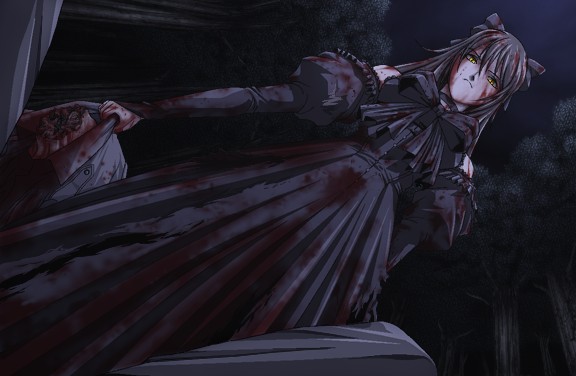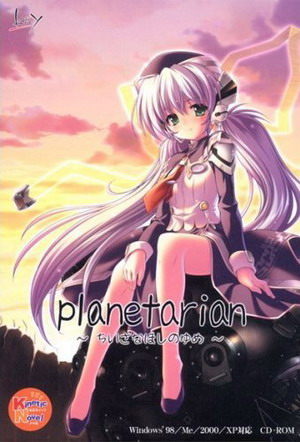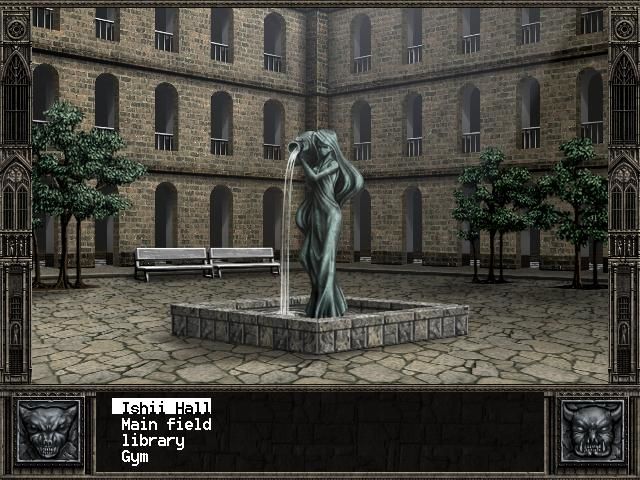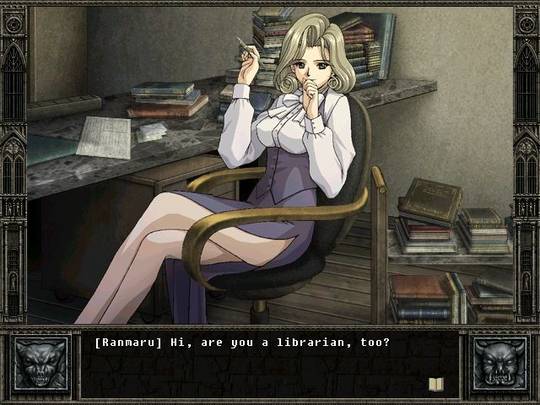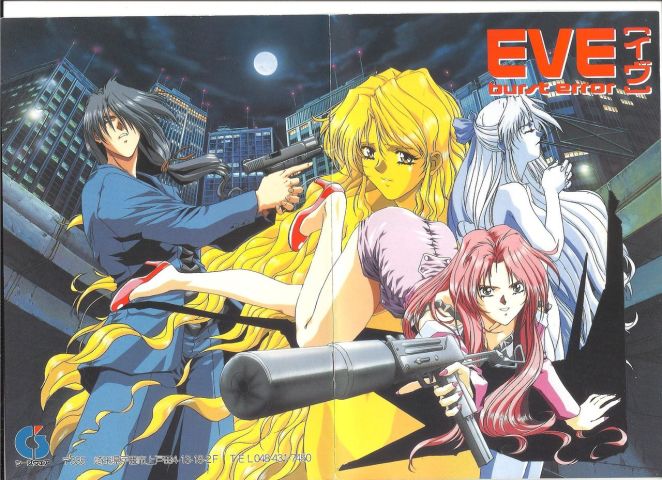Although it’s been difficult finding a jumping on point, in English, that captures the turning point whereby adventure games began to turn into Visual Novels in a meaningful way, I think that it definitely shows in Eve that the easy flowing game-style of today hasn’t quite been hit upon yet. There are two things about Eve that are really showing their age (neither of which I’m holding against the game from an enjoyment perspective).
1) Gameplay isn’t about reading and then making a choice 10 -20 minutes down the road that will affect the outcome of the story. Gameplay is a quasi-point and click style without the puzzles or the clicking. After every selection/dialogue the player is asked to select from a menu including things like speak, think, move, examine etc. in order to bring up the next relevant piece of information or dialogue. Presumably this is to keep the player constantly engaged and interacting with the game but unfortunately it just means one develops RSI from the unnecessary clicking one is asked to do. The added frustration is that you often have to repeat selections to progress and it’s easy to end up in a situation where you think you ought to be selecting something else, resulting in you frantically clicking through every option to find the right one and re-reading text multiple times. Alongside this issue Eve has a dual character scenario which allows you to complete as much as you can with one character before switching and playing the story with the other. It’s a great idea but there’s no signal to say that you can’t progress any further, so you can find yourself moving aimlessly from one location to another, wondering if there’s anything to do that will trigger another section.
So far these are simply minor frustrations and completely understandable in a game from an era that was discovering and experimenting with new systems and new ways to tell stories. It’s fair to say that this doesn’t quite work, but it doesn’t really detract from the compelling nature of the story thus far,
2) From what I understand Eve: Burst Error began its life as an eroge game. And only shifted focus when it was discovered that people thought the plot was strong enough and intriguing enough that it didn’t need the sex to sell. Given that every other VN I can find from this period is a straightforward (and boring) Eroge, this seems like a fairly bold move , and fortunately a successful one. However, whilst playing the game it’s easy to see the remnants of the pure porn buried within and characterisations of the primary characters are marred by the constant sexual asides which, whilst sometimes pretty amusing, are often out of place and frequently tiring. A character flirting with a beautiful female reporter is one thing, but constant references to how obsessed he is with women, wanting to lick her face and so on are very off from a character perspective in what is otherwise – so far – a hard-boiled murder mystery. I’m interested to see how attitudes towards sex change over time in these games. So far it’s also not marring my enjoyment of the main story, but it’s a stylistic peculiarity that in hindsight could have been dispensed with.
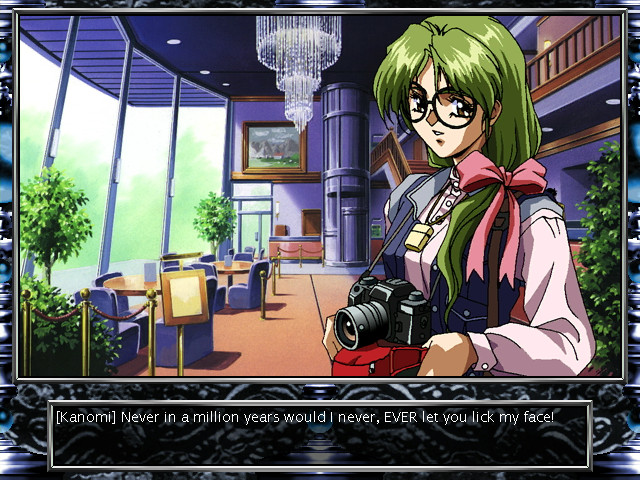
Not a major plot point,
So that’s how the game plays, but what about the story?
What I love about the Visual Novel style is that it’s not in any hurry to get you anywhere. Having just complained about the sexual asides, I will say that I love the fact that characters are introduced and their relationships fleshed out through dialogue and banter in a way that isn’t found in any other form. Other forms (even doorstop fantasy sagas) attempt an economy of delivery, trying to get information across with every sentence or camera shot or line of dialogue. Digressions usually have a point. In the first scene of Eve we learn about the main character by looking around the room, chatting to the reporter about her camera and sex, and then eventually she’ll drop the detail that you were fired from the force for an indiscretion and struggling to make your own way as a PI. Any narrative expert would call this uneconomical and badly designed, but actually I find that there’s something naturalistic and engrossing about it. You never quite know when the story is going to move forward and shift into gear and I expect it will offer surprises when it does.
So far we have
Kojiroh’s Story
Kojiroh himself would be a better character if he weren’t such a random lech. He’s no Philip Marlowe; he comes across as endearingly naïve but I’m not as yet sure this is the intent. I suspect he’s going to prove to have some serious skills (as well as being attractive to the ladiez). He does shift from being very confident in his dealings with the Detective Agency and Mr.Ko, to rather bashful around Glen or a waitress who slaps him about a lot. I don’t know if I like him as a character but I like where the plot is going.
After his sexy reporter friend Kanomi a lead for a job (at what he sees as an exorbitant price), Kojiroh finds himself visiting one Mr.Ko, who tasks him with locating an Islamic painting (which turns out to be the size of a matchbook) which has perhaps been stolen from his premises. There’s the weird proviso that the painting is not moved when it is found, no matter where, but the consolation that the reward will be great. Mr.Ko has hired two others from a Detective agency, one Nikaido, a guy who is hated by Kojiroh and he shows his disdain every sentence, the other Yayoi who seems to be an ex-lover and so there’s a lot of tension and competition. Kojiroh finds evidence of a burglary but it seems to him that the evidence was a little too obvious and wonders if this is a setup by Mr.Ko.
He then meets Glen in a hotel bar. An ex-convict, he seems deferential towards Glen but wants him to help find leads. Glen gives Kojiroh an illegal firearm. It was around here that I got stuck and switched to Marina’s story.
Marina’s Story
Marina is some kind of international agent working for the government with “the Chief” (a nickname from a previous job) who she is friends with. There’s a lot of banter about the chief leaving his wife and the suggestion that the two of them might hook up in the future, although Marina seems interested in a female acquaintance she’s had past relations with. She’s given the unenviable of playing bodyguard to Ambassador Mido’s daughter who is under threat from Middle-Eastern terrorists, since she’s not in the good books from her last mission. As it stands, she’s just checked in for her first day of work at the school where the daughter attends.
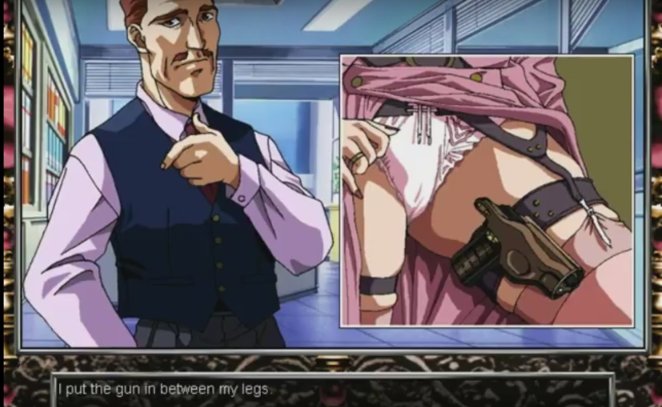
No innuendo there!
I’ve been playing for a decent amount of time, and as mentioned before, the story is progressing relatively slowly; but that’s by no means a bad thing. Despite the niggling faults of characterisation I’ve mentioned, it’s hard not to be intrigued as to where this is going – Kojiroh’s story already contains an interesting mystery which can only deepen as we meet more characters and situations surrounding it. Marina’s has yet to take off and promises to be more of an action-oriented thrill ride. It’s also a very funny story, and whilst a lot of the sexual humour is a little over the top, there have also been numerous interactions that have made me laugh out loud, particularly when one character insults another for various reasons. There are also these bizarre recurring options such as “examining shrubberies” and sitting in bizarre ways in the middle of the street. You can look at the ceiling or crawl on all fours under your bosses desk for no obvious reason. The intent is just to make you smile, and it usually works. Some may not enjoy the constant 4th wall breaking but in a long drawn out game where one takes frequent breaks away from the PC for everyday life, I think it’s appropriate in a way that it maybe wouldn’t be in a movie or TV show.
A very enjoyable experience so far. What’s telling is that I’m eagerly anticipating getting back to it and finding out where the story goes from here.

